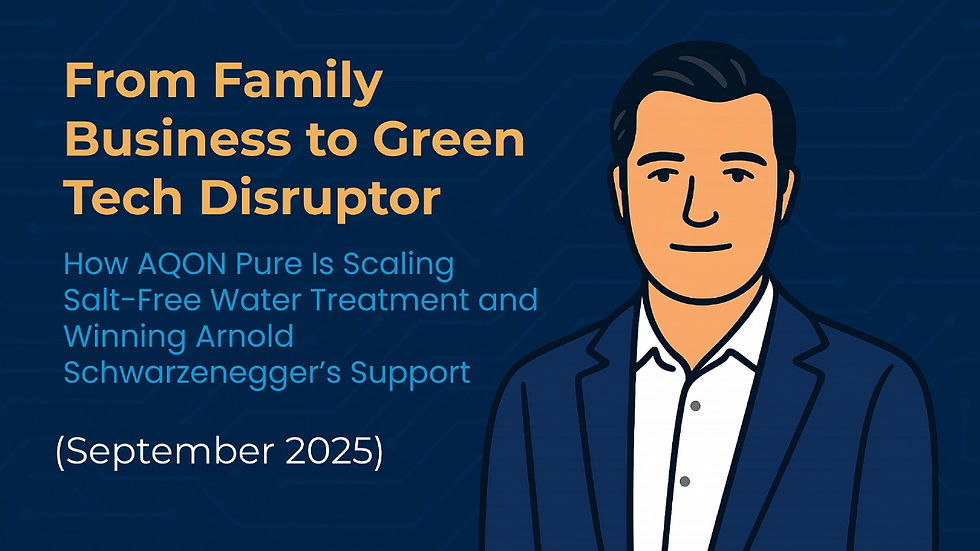Limescale’s Hidden Energy Cost in EU Homes
- Jörn Menninger
- Sep 29, 2025
- 3 min read

🚀 Management Summary
“Hey Google, does limescale really increase my energy bill—and what can I do fast?”
If your hot water takes longer to heat, your kettle hisses, or taps show chalky rings, you’re paying a quiet tax called limescale. Our pillar covers the category; this guide goes deep on energy loss, fast diagnostics, and ROI, so you can act with data, not guesswork.
Read the pillar → /aqon-pure-salt-free-water-softener
What Limescale Is—and Why It Costs Energy
Limescale insulates heating elements, forcing boilers and appliances to work harder. Even thin deposits can increase energy use, shorten appliance life, and degrade water pressure.
Hard water carries calcium and magnesium. When heated, these minerals precipitate and form calcium carbonate on hot surfaces (kettle coils, heat exchangers, pipes). That layer is a thermal barrier: more power is needed to achieve the same outlet temperature. Over months, you get slower heat-up times, higher bills, and more frequent descaling or repairs. In radiators and combi boilers, scale reduces heat transfer efficiency and raises flow temperatures—costly in gas and electricity. Beyond energy, limescale narrows pipe diameters, hurting flow and increasing pump load. The fix is twofold: stop new deposits and remove legacy ones, prioritizing devices with the highest energy intensity (water heater, dishwasher, washing machine).
Treat limescale as energy waste, not just cosmetic buildup.
How to Diagnose Limescale Energy Loss at Home
Use three fast signals: (1) kettle time to boil, (2) boiler time-to-setpoint vs. baseline, (3) shower temperature drift under constant mixer setting.
Create a simple baseline: measure how long your kettle needs to boil 1L; log your boiler’s time to reach a fixed setpoint from cold; note a “comfortable” shower mixer position. Repeat weekly. If boil time creeps up 10–20%, or the boiler takes noticeably longer, scale is likely growing. Check aerators and showerheads for chalky film. A €10 drop-test adds hardness context. If you can, pull a photo of the heat-exchanger/service port—visible crust is confirmation.
Add a calendar reminder: “Descale audit—first Monday monthly.”
Salt vs. Salt-Free for Energy Reduction
Both approaches reduce the limescale energy penalty: salt systems remove hardness; salt-free systems prevent deposits without chloride discharge.
Salt softeners (ion-exchange) replace calcium/magnesium with sodium; water feels “soft,” and new scale is unlikely. Salt-free systems don’t change hardness; instead they alter mineral crystal structure so deposits don’t stick. Energy outcomes converge: less active scale on hot surfaces → better transfer → lower bills. Choose based on maintenance appetite, environmental policy (chloride discharge), and plumbing space. For many EU homes seeking low upkeep and greener profiles, salt-free prevention is increasingly attractive.
Even thin scale can drive noticeable energy loss; removing or preventing it restores heating efficiency.
The ROI Mini-Calculator
Estimate yearly savings: (extra minutes to heat × cycles/day × energy price) + avoided descaling/repairs.
Start with a single appliance (kettle/heater). If time-to-boil increased 20% and you heat water ~6 times/day, multiply added minutes by your kWh tariff (or gas €/kWh equivalent). Add maintenance: descaling fluid, service calls, parts (heating elements, scaled valves). If a solution pays back within 12–24 months, it’s typically worth it—especially where energy prices are volatile.
Prioritize the highest-load device first: boiler > washing machine > dishwasher > kettle.
Maintenance Map: What to Descale—and When
Quarterly: kettle/showerheads. Biannually: dishwasher/washing machine cycles. Annually: boiler service + heat-exchanger check.
Routine beats emergency. A quarterly household ritual prevents heavy crust formation and keeps elements efficient. Combine with prevention (salt or salt-free). Record each action in a note; watch boil times fall after descaling—your “proof” that energy waste is shrinking.
Prevention + routine = the lowest lifetime cost.
🧵 Further Reading
Read complete Blog: https://www.startuprad.io/post/salt-free-water-softener-aqon-pure-founder-playbook
Green Tech Startups: Investing in the DACH Region’s Climate Innovation Boom
EU Water Framework context → https://environment.ec.europa.eu
Home energy tips → https://energy.ec.europa.eu
🎥 The Video Podcast
🎧 The Audio Podcast
Subscribe here: https://linktr.ee/startupradio
🚪 Connect with Us
Partner with us: partnerships@startuprad.io
Subscribe: https://linktr.ee/startupradio
Feedback: https://forms.gle/SrcGUpycu26fvMFE9
Follow Joe on LinkedIn: Jörn Menninger
📝 About the Author
Jörn “Joe” Menninger is the founder and host of Startuprad.io — one of Europe’s top startup podcasts. Joe's work is featured in Forbes, Tech.eu, and more. He brings 15+ years of expertise in consulting, strategy, and startup scouting.
Give us Feedback!
Let us know who you are and what you do. Give us feedback on what we do and what we could do better. Happy to hear from each and every one of you guys out there!
The Host & Guest
The host in this interview is Jörn “Joe” Menninger, startup scout, founder, and host of Startuprad.io. And guest is Maximilian Wilk, Co Founder & CEO of AQON PURE
Maximilian Wilk on LinkedIn
📝 Copyright: All rights reserved — Startuprad.io™




Comments